Samhita Arni, Eka Kurniawan, Ivy Alvarez and Patrick Holland straddling cultures at the Brisbane Writers Festival
In this Brisbane Writers Festival panel, artists Samhita Arni, Eka Kurniawan, Ivy Alvarez and Patrick Holland shake the boundary fence to explore identity, acceptance and belonging through artistic expression in the new world of globalism and ‘self-culture’, and ask if Australia really is the world’s cultural melting pot.
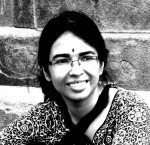 Samhita Arni is the author and illustrator of The Mahabharata – A Child’s View, and, in collaboration with Moyna Chitrakar, created the New York Times bestselling graphic novel Sita’s Ramayana. Her third book, The Missing Queen, was published jointly by Zubaan and Penguin. Samhita was a screen writer on the feature film Good Morning Karachi and worked as the head scriptwriter on The Defenders, a TV show in Kabul, Afghanistan. She was the 2014 writer-in-residence at the FIND – India Europe Foundation for New Dialogues, and has been awarded the 2015 FIND Foundation grant. Earlier this year, Samhita was a British Council – Charles Wallace India Trust Writing Fellow at the University of Kent.
Samhita Arni is the author and illustrator of The Mahabharata – A Child’s View, and, in collaboration with Moyna Chitrakar, created the New York Times bestselling graphic novel Sita’s Ramayana. Her third book, The Missing Queen, was published jointly by Zubaan and Penguin. Samhita was a screen writer on the feature film Good Morning Karachi and worked as the head scriptwriter on The Defenders, a TV show in Kabul, Afghanistan. She was the 2014 writer-in-residence at the FIND – India Europe Foundation for New Dialogues, and has been awarded the 2015 FIND Foundation grant. Earlier this year, Samhita was a British Council – Charles Wallace India Trust Writing Fellow at the University of Kent.
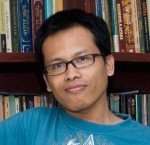 Eka Kurniawan was born in 1975 and is the author of novels, short stories, essays, movie scripts, and graphic novels. He has been described by the Jakarta Post as ‘one of the few influential writers in Indonesia. His novels include Tiger Man and most recently Beauty is a Wound.
Eka Kurniawan was born in 1975 and is the author of novels, short stories, essays, movie scripts, and graphic novels. He has been described by the Jakarta Post as ‘one of the few influential writers in Indonesia. His novels include Tiger Man and most recently Beauty is a Wound.
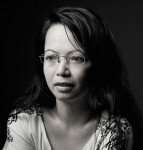 Ivy Alvarez is the author of two poetry collections: Disturbance (Seren Books, 2013) and Mortal (2006). A recipient of writing residencies from MacDowell Colony, Hawthornden Castle and Fundación Valparaiso, her work appears in journals and anthologies in many countries, with individual poems translated into Russian, Spanish, Japanese and Korean. You can learn more about her work on her website: www.ivyalvarez.com
Ivy Alvarez is the author of two poetry collections: Disturbance (Seren Books, 2013) and Mortal (2006). A recipient of writing residencies from MacDowell Colony, Hawthornden Castle and Fundación Valparaiso, her work appears in journals and anthologies in many countries, with individual poems translated into Russian, Spanish, Japanese and Korean. You can learn more about her work on her website: www.ivyalvarez.com
 Patrick Holland (contributing chair) is the award-winning author of Navigatio, The Source of the Sound, The Mary Smokes Boys, Riding the Trains in Japan and The Darkest Little Room. His work has been published in Australia, the USA, the UK, Japan and Italy, and has been recognised by such as the Miles Franklin, the Age Book of the Year, The Scott Prize and the Queensland Premier’s Awards. His writing pursues minimalism and literary ambience in the vein of Arvo Part and Yuki Kurita. He was born and grew up in outback Queensland, studied and worked in China, Japan and Vietnam, and now spends his time between Brisbane and Saigon whilst studying and working at QUT.
Patrick Holland (contributing chair) is the award-winning author of Navigatio, The Source of the Sound, The Mary Smokes Boys, Riding the Trains in Japan and The Darkest Little Room. His work has been published in Australia, the USA, the UK, Japan and Italy, and has been recognised by such as the Miles Franklin, the Age Book of the Year, The Scott Prize and the Queensland Premier’s Awards. His writing pursues minimalism and literary ambience in the vein of Arvo Part and Yuki Kurita. He was born and grew up in outback Queensland, studied and worked in China, Japan and Vietnam, and now spends his time between Brisbane and Saigon whilst studying and working at QUT.
Ivy — an adventurous spirit and capable confidence
Ivy read a striking and powerful poem called ‘Vena Cava’ from her collection Mortal which tracks a mother-daughter relationship and also movement from the Philippines to Australia. Patrick drew out the sense of a fragmentary identity.
In my own writing I’ve enjoyed that kind of strangeness, I’ve often enjoyed the feeling of being an outsider, and I realize there are often some traumas and delights in that.
Having lived in so many different places, Ivy felt she’s able to modify her actions and relates to people more readily out of necessity. When she was growing up in Australia in the 1980s (SBS hadn’t travelled as far a Hobart where she was living at that stage) she was very different from everyone else. Her siblings and her, plus one other child, were the only Asian students at her primary school – “it was a learning curve, having to make your own space and make people understand they weren’t that different to them.”
She now lives in Auckland, and is enjoying discovering things about her new country.
Samhita — intensity and passion
She considered the difficulty of travelling being that whenever you go home you feel like an outsider. She describes her identity as an Indian a ‘very complicated thing’, because she has spent so many years outside of the country and gained so much from that which she’s made part of herself.
You see your own surroundings in a different light, so I think that’s what is gained. You see a lot of truths that might not be so apparent when you’re in the circumstance, when you have an outsiders perspective.
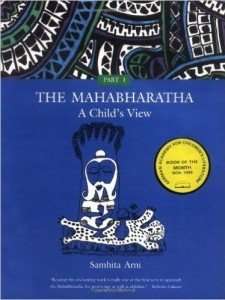 In response to Patrick’s question of why she took on the task of rewriting classic Hindu texts at such a young age, Samhita spoke about myths being a form of psychology, how they’re very much like dreams and are how our minds are culturally hard-wired. She explained, ‘These metaphors still rule our lives… The Ramayana and Mahabharata are still very much a part of the politics in India today.”
In response to Patrick’s question of why she took on the task of rewriting classic Hindu texts at such a young age, Samhita spoke about myths being a form of psychology, how they’re very much like dreams and are how our minds are culturally hard-wired. She explained, ‘These metaphors still rule our lives… The Ramayana and Mahabharata are still very much a part of the politics in India today.”
Samhita described how the Mahabharata spoke to her because it precisely resonated and provided a parallel/allegory to her circumstances as a child. Her father is an Indian diplomat and at 8 years old, after spending 3 years in Pakistan, she had moved back to India. Since tensions were high between India and Pakistan at that time, school children responded badly to her saying she’d come from Karachi, Pakistan. She was bullied and ostracized as though she were a Pakistani, even though she was originally from India.
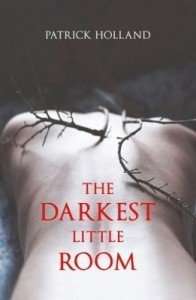 Patrick raised the concept of ‘exoticism’ and how Elliot Wineberger has coined the phrase ‘a middle-class appetite for the strange or what’s exotic’ – observing the danger and squalor of poverty from a distance, and asked, “How do writers makes sure they make sure they give an authentic account of the places they write about and resist exoticizing them?”
Patrick raised the concept of ‘exoticism’ and how Elliot Wineberger has coined the phrase ‘a middle-class appetite for the strange or what’s exotic’ – observing the danger and squalor of poverty from a distance, and asked, “How do writers makes sure they make sure they give an authentic account of the places they write about and resist exoticizing them?”
He explained that people have been critical of his own work, saying that it’s ‘the male gaze on Vietnamese prostitution and a very exotic look at the situation’ and described his struggle to find the authentic depiction of what he’s writing about.
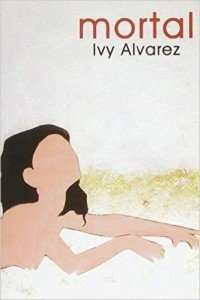 Ivy spoke about her use of western myth in ‘Mortal’, Persephone and Demeter underpin the mother-daughter relationship, but that no one has accused her of supplanting Greek myth to tell her story.
Ivy spoke about her use of western myth in ‘Mortal’, Persephone and Demeter underpin the mother-daughter relationship, but that no one has accused her of supplanting Greek myth to tell her story.
Ivy is writing from the child’s perspective that has grown up and still has something to say about the exoticization of women that is happening, the tourism industry there, and what is being taken away from the country, and not being given back.
In ‘Hollywood Starlet’ she is putting western women (the Marilyn Monroe trope) and putting them in situations she has been in, imagining how they would live their lives in a more personal way than how we see them… as a gloss of a character. Linking those two personas was a way for Ivy to explore her own identity.
Eka — unassuming but wise and philosophical perspective
Home for Eka is a small town in South Java but he is currently living in Jakarta (because his daughter is in school there) and writing in Bahasa Indonesian (his second language).
In response to being touted as ‘the modern voice of Indonesia’, Eka explained that Indonesia is made up of many cultures, and since ‘Indonesian culture’ is still being developed, the language is only 70 years old, there’s no set thing yet.
I’m not the representation of Indonesia, I’m just a part of it.
 He believes what he has done in writing his novel is just a part of what Indonesia will become. Beauty is a Wound, spans the time from Dutch colonialism to Suharto. The novel’s hero is a ghost of a village man who enacts a revenge on the Dutch lord who stole the love of his life and forced her to become his concubine.
He believes what he has done in writing his novel is just a part of what Indonesia will become. Beauty is a Wound, spans the time from Dutch colonialism to Suharto. The novel’s hero is a ghost of a village man who enacts a revenge on the Dutch lord who stole the love of his life and forced her to become his concubine.
Just listening to the reading of the first page of Beauty is a Wound had me putting it on my reading wish list immediately.
Patrick spoke about the importance of ghosts in Asian cultures, and how the notionally ‘rationale’ and ghost belief systems are intertwined, while in most Western cultures they seem almost antagonistic.
Eka gave a brief explanation of Indonesian ghost lore.
We believe we share this world, this universe, with other souls. We live side by side with them, and perhaps know a bit about them, but really we know almost nothing. But even though we don’t know everything about them, that doesn’t mean they don’t exist.
Ivy confirms ghosts play a large part in Philippine culture too. “You have fear for ghosts but you revere them as well. They keep people, especially children, in line…. But linked with that is a reverence for your elders and respect for them… This idea that your ancestors are still there, still keeping an eye on you, so you better behave, otherwise they’ll punish you.”
In India the folklore is often linked with the idea of reincarnation.
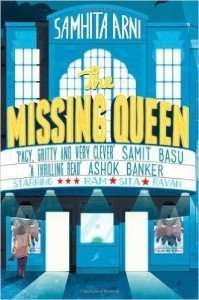 Samhita explains that while there are many different retellings of the Ramayana, since the current ruling political party has appropriated a particular version, it can be very dangerous to talk about other versions. So their tradition is effectively being white-washed and their heritage is being lost in the guise of preserving it. Samhita believes they are losing a lot more than they are gaining.
Samhita explains that while there are many different retellings of the Ramayana, since the current ruling political party has appropriated a particular version, it can be very dangerous to talk about other versions. So their tradition is effectively being white-washed and their heritage is being lost in the guise of preserving it. Samhita believes they are losing a lot more than they are gaining.
Talking about this is politically contentious and to suggest there are other versions can get you thrown into jail.
Samhita read a tension-filled passage from her thriller The Missing Queen.
Patrick asked the panel about the extent to which their religious faiths influence their work.
Any faith that resists questioning, that resists the challenge that a question throws at it, that resists knowledge and curiousity, and that resists any potential for positive change, is not a strong faith. – Samhita Arni
While Ivy is not a practicing Catholic, she respects and admires the beauty in the rituals.
Eka explained that while perhaps statistically a majority muslim nation, to him Indonesia feels more like a melting pot of religions. While he is Muslim, people do hold Christian beliefs, and Hinduism and Buddhism is also widely practiced.
As to whether Australia is really the world’s cultural melting pot?
Patrick referred to the very recent ‘Border Force’ debacle and quoted G K Chesterton in respect to cosmopolitanism, “I’m a bit suspicious, I think it may be just many tribes learning one tribe’s tricks”.
Samhita noted the distinction between being cosmopolitan and being pluralist.
Pluralism is about being willing to accept different points of view; cosmopolitan just means you are willing to superficially engage with them.
The panel was asked whether they have fear of reprisals when they write.
Patrick felt that while of course no one wants to get thrown into a gulag, writers in Australia almost lament that no one cares, we can write almost anything.
Eka responds that he is lucky that he began writing 3 years after Suharto’s rule ended.
Samhita explained that 3 writers have been killed in India this year so far (philosophically noting that given the size of the Indian population, percentages remain in her favour though). She related the view of an Iranian poet she knows — “She said that for her it’s a test of her creativity to figure out how to write stuff that would get past the censors but still say what she said. So the best case is to look at it as a creative challenge.”
I think poetry flies too far under the radar. And I am privileged in that way, that I don’t have to kowtow to commercial concerns and change what I want to say in my poetry. But I know a lot of people don’t have that privilege, so I feel similarly lucky. – Ivy Alvarez
Generally the panel have found Australia, despite different to their expectations (where are the surfboards?), welcoming and generally accepting, very ‘not racist’.
Ivy made the point that we are all the same, we feel the same emotions, we all have blood running through our veins and we are not that different from each other.
In this talk of globalization, there’s no need for this otherness — as long as we just talk to each other and have conversations with each other, share in the differences and embrace the similarities.
